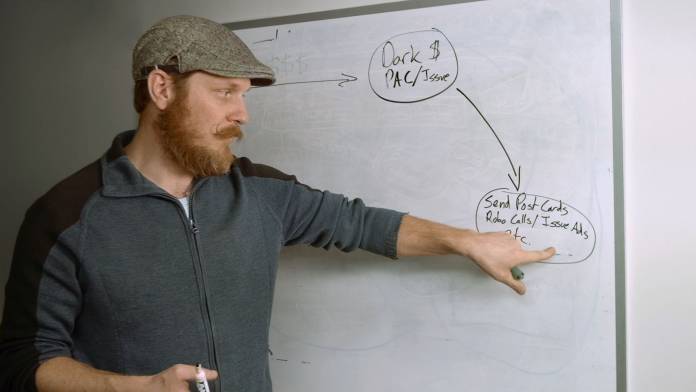MOVIES When Kimberly Reed first heard about Citizens United, the 2010 Supreme Court decision that determined corporations were people and money was speech, allowing huge amounts of money to be spent on election campaigns, she was stunned and horrified. Since she’s a documentary filmmaker, she wanted to make a movie about it. But she wasn’t sure of a way into a story about corporate control of politics.
Reed is from Montana, a place where people take transparency in campaign finance seriously. More importantly, she says, they feel they can do something about it. This was the insight from which her documentary Dark Money, opening this weekend, was born.
Many people wouldn’t expect such deep distrust of corporate influence in a state like Moantana, which Trump won by 20 points. But Reed says Montana has a progressive history, with important labor and organizing movements starting in the mines there. And transparency in campaign donations is a big issue due to the history of the so-called Copper Kings, who blatantly bought political influence.
“These three rich guys from the East Coast came in and vied for control of what at the time was known as the richest hill on earth,” she said, “which was where the Anaconda Mining Company started.”
In 2012, Reed heard that Montana’s attorney general—and now governor—Steve Bullock (she knew him from high school) had a case challenging Citizens United that looked like it would go to the Supreme Court. She decided to follow that story. She ended up spending more than five years there, making her new documentary, Dark Money, which premiered at Sundance this year.
“I didn’t quite know how to tell the story, but I knew that Montana was going to be a battleground for it,” she said. “It’s an issue everywhere, but I think telling the story with Montana as a case study gave me opportunities to visualize as a filmmaker and to wrap it around human beings.”
In the beginning of Dark Money, we see Republican politicians targeted just days before their primaries, with fliers contained falsehoods going out to voters.
“It’s not red vs. blue: This is a nonpartisan issue and this happens intraparty,” Reed said. “The goal of those dark money attacks is not about getting a Republican into office instead of a Democrat—it’s about which Republican you’re going to get into office. It’s about purifying, from the point of view of the dark money group, the Republican party and pulling it to a more extreme position. And they’re trying to do that anonymously. What you saw is a rapid polarization of the political dialogue in Montana, and I think that’s emblematic of what we’re seeing across the country.”
Help us save local journalism!
Every tax-deductible donation helps us grow to cover the issues that mean the most to our community. Become a 48 Hills Hero and support the only daily progressive news source in the Bay Area.
A journalist, John S. Adams, keeps following the money and trying to find out who is behind the attacks. Reed met Adams a few years into her filming. He was one of the few reporters in the state covering money and politics, and she says initially they were commiserating. Reed knew she wanted to interview him for the movie. But then he became a sort of the narrator of the story.

“I realized that he would be the lens through which we could see story,” she said. “It was a narrative device to have him carry us through the story, and he becomes emblematic of the pressures daily newspapers face.”
Both Reed and Adams keep trying to trace the nearly untraceable corporate cash flowing into the elections. The characters in the documentary are engaging and Reed says they were “straight out of Central Casting.” She gets access to politicians, lawyers, meetings, and into court to see a tense trial at the end of the movie. All this leads to a documentary about campaign finance that Entertainment Weekly calls as “damning, clear-eyed, and as gripping as any John Grisham thriller.”
Montana has the strongest finance laws in the country after California, Reed says, and that makes her hopeful.
“I find that very heartening because if you can do it there, you can do it anywhere and that’s how this is going to move,” she said. “It’s going to be city council after city council, municipality after municipality, state after state, from the bottom up.”
DARK MONEY
Opens on July 27 in San Francisco
More info here.




